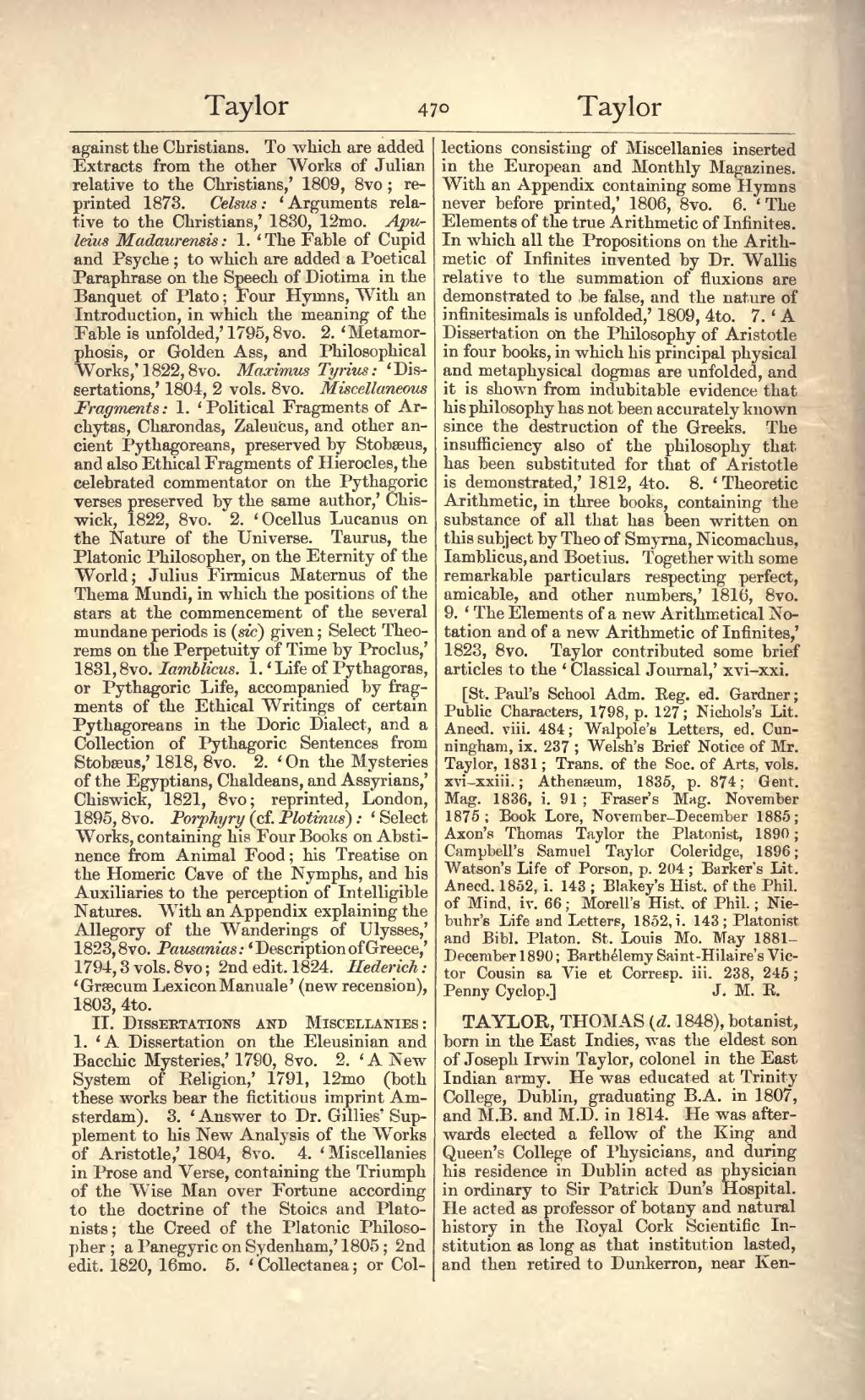against the Christians. To which are added Extracts from the other Works of Julian relative to the Christians,’ 1809, 8vo; reprinted 1873. Celsus: ‘Arguments relative to the Christians,’ 1830, 12mo. Apuleius Madaurensis: 1. ‘The Fable of Cupid and Psyche; to which are added a Poetical Paraphrase on the Speech of Diotima in the Banquet of Plato; Four Hymns, With an Introduction, in which the meaning of the Fable is unfolded,’ 1795, 8vo. 2. ‘Metamorphosis, or Golden Ass, and Philosophical Works,’ 1822, 8vo. Maximus Tyrius: ‘Dissertations,’ 1804, 2 vols. 8vo. Miscellaneous Fragments: 1. ‘Political Fragments of Archytas, Charondas, Zaleucus, and other ancient Pythagoreans, preserved by Stobæus, and also Ethical Fragments of Hierocles, the celebrated commentator on the Pythagoric verses preserved by the same author,’ Chiswick, 1822, 8vo. 2. ‘Ocellus Lucanus on the Nature of the Universe. Taurus, the Platonic Philosopher, on the Eternity of the World; Julius Firmicus Maternus of the Thema Mundi, in which the positions of the stars at the commencement of the several mundane periods is (sic) given; Select Theorems on the Perpetuity of Time by Proclus,’ 1831, 8vo. Iamblicus: 1. ‘Life of Pythagoras, or Pythagoric Life, accompanied by fragments of the Ethical Writings of certain Pythagoreans in the Doric Dialect, and a Collection of Pythagoric Sentences from Stobæus,’ 1818, 8vo. 2. ‘On the Mysteries of the Egyptians, Chaldeans, and Assyrians,’ Chiswick, 1821, 8vo; reprinted, London, 1895, 8vo. Porphyry (cf. Plotinus): ‘Select Works, containing his Four Books on Abstinence from Animal Food; his Treatise on the Homeric Cave of the Nymphs, and his Auxiliaries to the perception of Intelligible Natures. With an Appendix explaining the Allegory of the Wanderings of Ulysses,’ 1823, 8vo. Pausanias: ‘Description of Greece,’ 1794, 3 vols. 8vo; 2nd edit. 1824. Hederich: ‘Græcum Lexicon Manuale’ (new recension), 1803, 4to.
II. Dissertations and Miscellanies:
- ‘A Dissertation on the Eleusinian and Bacchic Mysteries,’ 1790, 8vo.
- ‘A New System of Religion,’ 1791, 12mo (both these works bear the fictitious imprint Amsterdam).
- ‘Answer to Dr. Gillies' Supplement to his New Analysis of the Works of Aristotle,’ 1804, 8vo.
- ‘Miscellanies in Prose and Verse, containing the Triumph of the Wise Man over Fortune according to the doctrine of the Stoics and Platonists; the Creed of the Platonic Philosopher; a Panegyric on Sydenham,’ 1805; 2nd edit. 1820, 16mo.
- ‘Collectanea; or Collections consisting of Miscellanies inserted in the European and Monthly Magazines. With an Appendix containing some Hymns never before printed,’ 1806, 8vo.
- ‘The Elements of the true Arithmetic of Infinites. In which all the Propositions on the Arithmetic of Infinites invented by Dr. Wallis relative to the summation of fluxions are demonstrated to be false, and the nature of infinitesimals is unfolded,’ 1809, 4to.
- ‘A Dissertation on the Philosophy of Aristotle in four books, in which his principal physical and metaphysical dogmas are unfolded, and it is shown from indubitable evidence that his philosophy has not been accurately known since the destruction of the Greeks. The insufficiency also of the philosophy that has been substituted for that of Aristotle is demonstrated,’ 1812, 4to.
- ‘Theoretic Arithmetic, in three books, containing the substance of all that has been written on this subject by Theo of Smyrna, Nicomachus, Iamblicus, and Boetius. Together with some remarkable particulars respecting perfect, amicable, and other numbers,’ 1816, 8vo.
- ‘The Elements of a new Arithmetical Notation and of a new Arithmetic of Infinites,’ 1823, 8vo.
Taylor contributed some brief articles to the ‘Classical Journal,’ xvi–xxi.
[St. Paul's School Adm. Reg. ed. Gardner; Public Characters, 1798, p. 127; Nichols's Lit. Anecd. viii. 484; Walpole's Letters, ed. Cunningham, ix. 237; Welsh's Brief Notice of Mr. Taylor, 1831; Trans. of the Soc. of Arts, vols. xvi–xxiii.; Athenæum, 1835, p. 874; Gent. Mag. 1836, i. 91; Fraser's Mag. November 1875; Book Lore, November–December 1885; Axon's Thomas Taylor the Platonist, 1890; Campbell's Samuel Taylor Coleridge, 1896; Watson's Life of Porson, p. 204; Barker's Lit. Anecd. 1852, i. 143; Blakey's Hist. of the Phil. of Mind, iv. 66; Morell's Hist. of Phil.; Niebuhr's Life and Letters, 1852, i. 143; Platonist and Bibl. Platon. St. Louis Mo. May 1881–December 1890; Barthélemy Saint-Hilaire's Victor Cousin sa Vie et Corresp. iii. 238, 245; Penny Cyclop.]
TAYLOR, THOMAS (d. 1848), botanist, born in the East Indies, was the eldest son of Joseph Irwin Taylor, colonel in the East Indian army. He was educated at Trinity College, Dublin, graduating B.A. in 1807, and M.B. and M.D. in 1814. He was afterwards elected a fellow of the King and Queen's College of Physicians, and during his residence in Dublin acted as physician in ordinary to Sir Patrick Dun's Hospital. He acted as professor of botany and natural history in the Royal Cork Scientific Institution as long as that institution lasted, and then retired to Dunkerron, near Ken-
